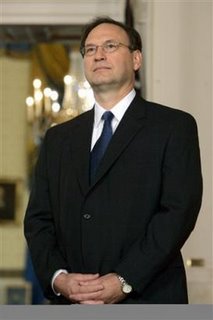
For all you ethno-cultural types out there:
Half a century ago it was a cliche to note that the United States was a Protestant country, dominated by a WASP [White Anglo-Saxon Protestant] elite. A great deal of the energy in the whole field of ethn0-cultural studies consisted of an assault on that elite.
If Alito is confirmed, and there is every reason to expect that he will, he will be the fifth Catholic sitting on the Supreme Court. Add in the two Jewish justices and that leaves only two seats occupied by WASPS.
One of the key weapons -- perhaps the key weapon -- used by ethnic minorities to assault the WASP citadel was the concept of "meritocracy", status within which was determined by academic and professional certifying institutions. Status and appointments reached through other means was labled "cronyism" or "favoritism."
Charges raised in both the 2000 and 2004 about Bush's personal history, the controversy over Condi Rice and Colin Powell's "blackness", and the turmoil precipitated by Harriet Miers' nomination all testify to the power exerted by the once-discredited concept of "the best and the brightest" and the controversies still surrounding it.
Perhaps it is time for historians to turn their attention to this concept -- its origins, it's success, and its consequences. Academic histories, produced by denizens of credentialing institutions, have been uncritically positive in discussing the subject, but Black and Hispanic critics in the political realm have been far less welcoming of a concept that produces results in which they are under-represented.
I would note that this concept was not new in the mid-twentieth century. It was a prominent part of Progressive ideology and can even be traced back to the idea, dealt with so well by Gordon Wood in Radicalism of the American Revolution, that the public should defer to "men of talent and ability."
Perhaps now would be a good time to step back and reconsider this concept that has done so much to shape contemporary American politics and society.
No comments:
Post a Comment